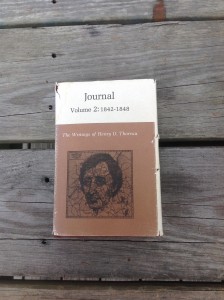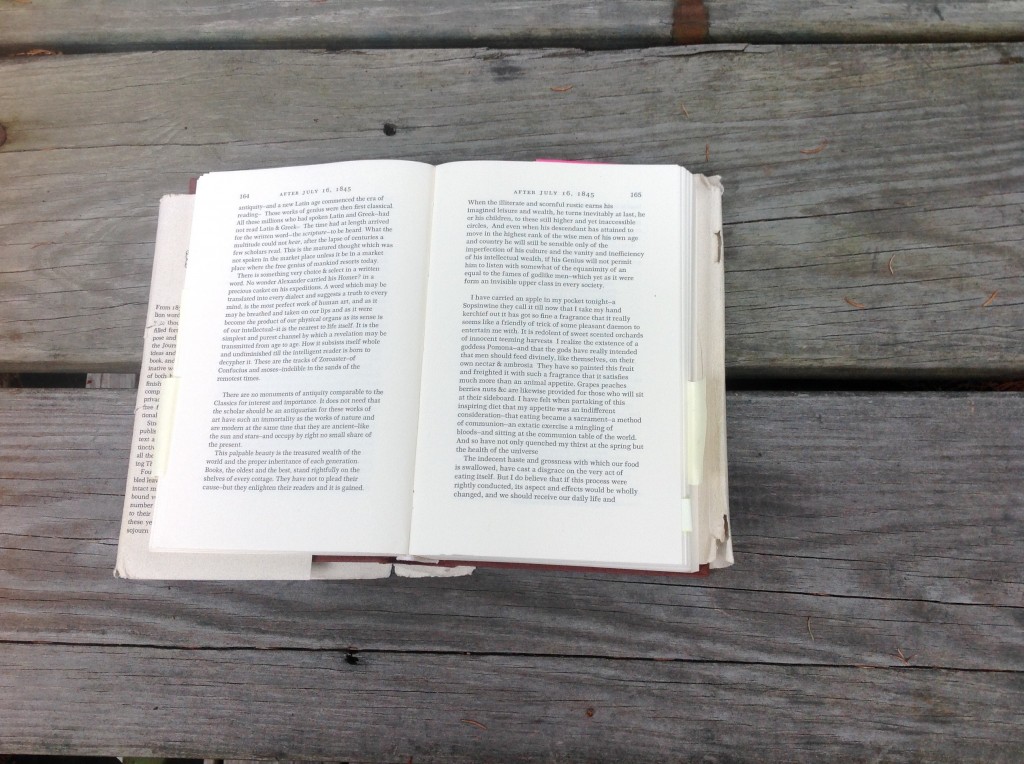It was unplanned, but over these July days, some 170 years after his move to Walden, I’ve fallen in with Henry and his stretched summer of ’45. Later, it would become part of Walden’s endless (nearly) summer, lasting for more than half the book before fall’s abrupt, punctuating chill arrived. But now, in his raw journal pages and in the mild light that forgets to dwindle each evening, I keep hearing susurration, summer’s saying, “ssssshhhure it’s okay to idle, maybe turn the page…maybe not.”
On or about July 16th that year, Alek Therien, who would become the woodchopper (and conundrum – is he as simple as one of his posts, or as wise as Homer?) in Walden, visits Thoreau, and, even in these unguarded pages, he’s unsure of what to make of his blunt guest. Therien offers advice on hoeing beans – wait ’til the dew dries – which Thoreau doesn’t credit, and he wants to be read to, which invites a visit from Homer himself.
“And now,” Thoreau writes, “I must read to him while he holds the book – Achilles’ reproof to Patrocles on his sad countenance
‘Why are you in tears, – Patrocles? Like a young child (girl) &c. &cOr have you only heard some news from Phthia?”
And on this question I pause. Phthia is Achilles’ and Patrocles’ home town, and they are far away at Troy. What might be happening when they are so far from home? Might their fathers be ill, or have died? Might invaders have appeared, just as they the Greeks have at Troy?
It seems significant that Achilles appears here near the inception of Thoreau’s Walden years. He will become a recurring reference in Thoreau’s book, a heroic ideal that casts light on Thoreau’s own purpose at Walden, where, following the archetype, he has set out to locate some secret, some sense of how to live, which he will bring back with him when he returns to town.
Okay, you may say, I know that.
But what has me falling in with Henry Thoreau these days is the implied wondering about the world he has left, the everyday Concord and its dusty roads and clanking cutlery. For me, summer creates the same sense of remove as the shift to Walden. Even when I don’t leave town, I leave its routine, its minute-by-minute machinations.
Instead I live in stretched time’s aforementioned Ss and the way a day’s light goes buttery in the near evening when corn and tomatoes and greens that absorbed that light even this morning form the table’s fare.
And sometimes the question rises: what is happening back in the little town of the everyday? Will I return? Who will be waiting?
For now, however, I am happy to be here, only perhaps an imagined mile or so out of that town, it’s true, but emphatically elsewhere. As was Henry Thoreau when he wrote from beyond Concord of a similar present on the 14th of July in 1845:
Here I know I am in good company – here is the world its centre and metropolis, and all the palms of Asia – and the laurels of Greece – and the first of the Arctic Zones incline thither.
Expansive summer.


